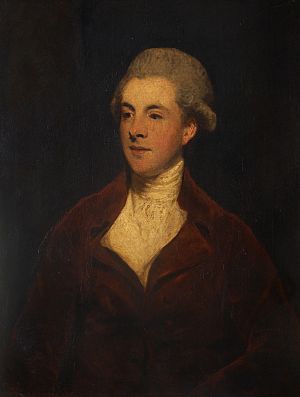Edward James Eliot facts for kids
Quick facts for kids
Edward James Eliot
|
|
|---|---|

Portrait by Joshua Reynolds
|
|
| Member of the British Parliament for St Germans |
|
| In office 1780–1784 |
|
| Member of the British Parliament for Liskeard |
|
| In office 1784–1797 |
|
| Baron Eliot | |
| In office 1804–1797 |
|
| Preceded by | Edward Craggs-Eliot |
| Succeeded by | John Eliot |
| Personal details | |
| Born | 24 August 1758 Cornwall |
| Died | 20 September 1797 |
| Spouse | Lady Harriot Pitt |
| Parents |
|
| Alma mater | Pembroke College, Cambridge |
Edward James Eliot (born August 24, 1758 – died September 20, 1797) was an important English politician. He served as a Member of Parliament, which means he was elected to represent people in the British government.
Contents
Edward Eliot's Early Life and Education
Edward James Eliot was born in Cornwall, England. His father was Edward Craggs-Eliot, a well-known politician. His mother was Catherine Elliston.
In 1775, Edward went to Pembroke College, Cambridge, a famous university. While there, he became very good friends with William Pitt the Younger. Pitt later became the Prime Minister of Great Britain. Edward finished his studies in 1780.
Becoming a Member of Parliament
After college, Edward Eliot began his political career. In 1780, he was elected as a Member of Parliament for St Germans in Cornwall. Later, in 1784, he was elected to represent Liskeard.
He quickly became an important person in the government. By 1782, he was a Treasury minister. This meant he helped manage the country's money. In 1783, he joined the government led by his friend, William Pitt the Younger. He was given another important role in 1785.
Family Life and Sadness
On September 24, 1785, Edward Eliot married Harriot Pitt. She was the younger sister of his good friend, William Pitt the Younger.
Sadly, their happiness did not last long. Just one year later, Harriot gave birth to their only child, a daughter named Harriot Hester. Five days after her daughter was born, Edward's wife, Harriot, died. She passed away due to problems from childbirth. Edward was heartbroken by this loss and never fully recovered from his grief.
Joining the Clapham Sect and Helping Others
After losing his wife, Edward Eliot moved to Broomfield, near Clapham. There, he met a group of people known as the Clapham Sect. This group was made up of religious reformers who wanted to make society better.
Edward had already been friends with William Wilberforce for many years. Wilberforce was a leading member of the Clapham Sect. Edward found himself living close to Wilberforce and other members of this group. He started to actively support their important causes.
Working for Change
The Clapham Sect worked on many important issues. Edward Eliot joined them in fighting for:
- The abolition of the slave trade: This meant ending the buying and selling of enslaved people.
- Prison reform: Making prisons fairer and more humane.
- Poor relief: Helping people who were struggling and in poverty.
Edward was very active in Parliament, speaking up for these causes. He also helped mediate between William Wilberforce and Prime Minister Pitt. This meant he helped them work together on their campaigns.
Later Years and Health Struggles
In 1793, Edward Eliot left his role at the Treasury because of his health. He was then appointed as a commissioner for Indian affairs. He also invested in the British East India Company. People expected him to become the governor-general of Bengal, a very important position in India.
However, Edward suffered from a long-term stomach illness. This health problem made it impossible for him to take on the role in Bengal.
Edward Eliot died on September 17, 1797, at Port Eliot in Cornwall. He was buried a few days later. Both William Pitt and William Wilberforce were very sad to lose their friend. Edward's brother, John, took over his title. John later became the Earl of St Germans.
 | James Van Der Zee |
 | Alma Thomas |
 | Ellis Wilson |
 | Margaret Taylor-Burroughs |

